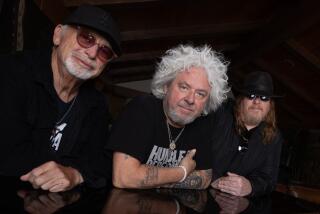Andrew Tosh Shoulders Reggae Legacy
- Share via
“Yeah, I always think that I might be a target,” said Andrew Tosh, son of gunned-down reggae star Peter Tosh. “I keep a good watch on my own head, you know. I always keep a good eye out looking for enemies, and my friends keep looking out for me.”
You don’t expect that wary attitude from a youthful performer. But then no one expected Peter Tosh’s career and life--he was 42--to end in sudden violence. The elder Tosh was killed in a robbery at his Kingston, Jamaica, home last September. The attack left two others dead and four more seriously wounded.
Peter Tosh helped define reggae to the international pop world, both as a solo artist and as a member of the original Wailers with Bob Marley and Bunny Wailer. But Tosh’s outspokenness made him enemies in Jamaica--he reportedly suffered several beatings by police there--and many people were at first openly skeptical that robbery was the real motive. One person has been arrested and charged with murder, and two suspects are still at large.
His father’s unexpected death has left its mark on Andrew Tosh, who will make his first live appearance outside Jamaica on Saturday, during a “Tribute to Peter Tosh” concert at the Starlight Amphitheater in Burbank.
“There are people watching me towards (to find out) what I got out of it (his father’s death),” he said in his lilting Jamaican dialect during an interview. “They see I’m serious and strong, so they may want to keep a bullet behind my head. I got to keep watching.”
But the younger Tosh expressed no concern about his local debut, for which he’ll be backed by his father’s band Word, Sound and Power.
“I don’t feel worried--just confident,” explained Tosh, 20, in the spartanly furnished West Los Angeles apartment that he’s called home during a three-week stay here. “(The music that’s) inside of me is gonna explode so there is nothing to be worried about.”
Proceeds from the Burbank concert, which is scheduled to begin at 2 p.m., will go toward a proposed museum at Peter Tosh’s burial site in western Jamaica, to the Freedom College in Tanzania (which houses and schools orphaned South African refugees) and L.A.’s reggae-oriented magazine Music Times.
Tosh’s performance will also feature a mid-set presentation of the 1988 Grammy for best reggae album that was awarded posthumously to his father for “No Nuclear War.”
“It feels good that Peter will receive a Grammy for his good works,” Andrew said. “It’s nice to know they’re still respecting him. I’m sorry he’s not here to come forward and receive it so I’ll receive it and do my work.”
The soft-spoken, lanky Tosh rarely smiled or volunteered extra information, repeatedly stressing the serious purpose behind his music and emphasizing that shouldering his father’s legacy was just one facet of developing his own identity.
“I’ve got my own style and my father’s thing endowed on me, so we’ve got to keep it moving,” he explained. “It’s a hard yoke to bear, but you’ve got to carry it because he’s gone and we just can’t leave it like that.
“We’ve got seeds--they are sown and we’ve got to keep it alive and keep it growing. The pressure, I’ve still got to live with that.”
Andrew Tosh had already embarked on a musical career before his father’s death. He has released three singles in Jamaica since 1985, including one produced by Jimmy Cliff, and performed with different bands at events around the island.
He listed such classic reggae and R & B performers as Bunny Wailer, Stevie Wonder, Dennis Brown, Gregory Isaacs and Michael Jackson as his favorite artists--not the deejays (the Jamaican equivalents of American rappers) who have been so popular in Jamaica over the past few years.
“I don’t like any kind of deejay business,” he declared. “They have a work to do, too, but I think on a bigger level of writing music and getting inspiration from the Almighty to sing songs. We have to write for our self because our feeling is a natural feeling.”
Tosh said his decision to pursue a musical career was personal, rather than an outgrowth of his father’s influence. But Peter played a more central role in Andrew’s decision to embrace Jamaica’s Rastafarian religion when he was 13.
“It was the influence of my father to see Rasta as a good religion,” Andrew said. “My father started to teach me, and I got serious in it. I was christened in the Catholic Church and really grew up on the Christian thing, but when you get older, you see and know things more so you take a position for yourself.”
Andrew’s uncle, Bunny Wailer, has become a second mentor, advising him on voice exercises and a fitness regimen that Tosh has taken to heart--he regularly jogs, rides a unicycle, swims and plays soccer.
And he knows one person with firsthand knowledge of the pressures and expectations confronting him: Ziggy Marley, the son of the late Bob Marley.
“I will sit with Ziggy and reason (talk things over),” said Tosh. “We’re even planning on teaming up to get some works (songs) finished. Bunny Wailer’s idea is to get the three of us to do a song and reunite the Wailers.
“We have serious work to continue, so we can’t play with it. It’s got to be dealt with 100%, carefully.”
More to Read
The biggest entertainment stories
Get our big stories about Hollywood, film, television, music, arts, culture and more right in your inbox as soon as they publish.
You may occasionally receive promotional content from the Los Angeles Times.










